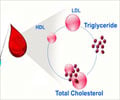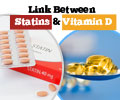Treatment of zebrafish with the cholesterol-lowering medication ezetimibe appears to reduce the risk of typhoid infection.
Highlights:
- The susceptibility to typhoid infection varies among individuals
- Some people exposed to the infection do not suffer, from it while others develop symptoms
- Scientists evaluated the possible link between a mutation in the VAC14 gene and the risk of typhoid infection
Cholesterol-lowering medications could possibly have effects that are totally unrelated to their intended use, which could be beneficial to the patient. New research published in the Proceedings of the National Academy of Sciences suggests that is possible that they protect against infections like typhoid! Cholesterol-lowering medications reduce the risk of heart disease and stroke. They keep the blood cholesterol levels within normal limits, thus preventing its accumulation in the walls of arteries, which can block the flow of blood to vital organs.Statins like rosuvastatin and atorvastatin are the most popular; they prevent the synthesis of bad cholesterol by inhibiting the enzyme HMG CoA reductase, and are therefore, also called HMG CoA reductase inhibitors. Other cholesterol-lowering drugs include the bile acid binding agents cholestyramine, colestipol and colesevelam, the fibrates like gemfibrozil, niacin, the omega-3 fatty acid ethyl esters, and the selective cholesterol absorption inhibitor ezetimibe.
People are variably susceptible to the Salmonella typhi; some people suffer from an infection when exposed to the S. typhi bacterium, while others may be totally unaffected. Scientists conducted a genome-wide study to find a possible genetic reason for this difference in susceptibility.
The scientists obtained cells from hundreds of healthy individuals and exposed them to typhoid bacteria tagged with a fluorescent marker. The marker enabled detection of the movement of the bacteria into the cells.
The scientists found that the cells that had a mutation in the VAC14 gene promoted the docking and entry of the Salmonella typhi bacterium into the cells. The cells with the mutation had high cholesterol levels in the plasma membrane. When the scientists knocked out the gene, more cells allowed the entry of the bacteria, thus confirming their findings.
The scientists took another step forward by treating a zebrafish with the cholesterol-lowering medication ezetimibe. Ezetimibe prevents the absorption of cholesterol from the intestines in human beings, thereby reducing its level in the body. The cholesterol in the intestine is obtained either from either dietary sources or is secreted into the intestine by the bile acids. The scientists added ezetimibe to the water around the fish and then injected the fish with the S. typhi bacteria. They found that the treated zebrafish were more likely to survive the typhoid infection.
Reference:
- Alvarez MI et al. "Human Genetic Variation in VAC14 Regulates Salmonella Invasion and Typhoid Fever through Modulation of Cholesterol," PNAS, doi: 10.1073/pnas.1706070114
Source-Medindia















